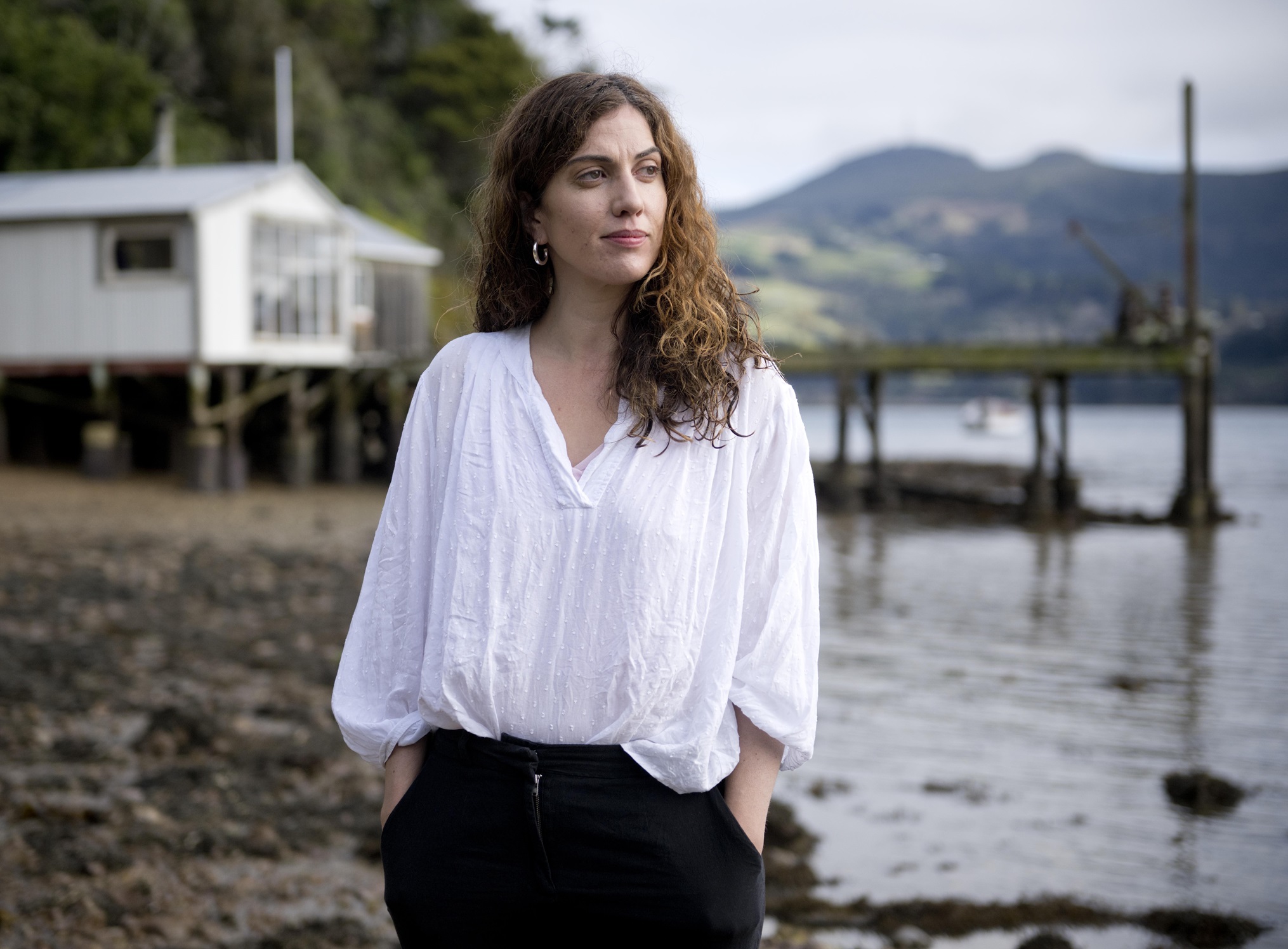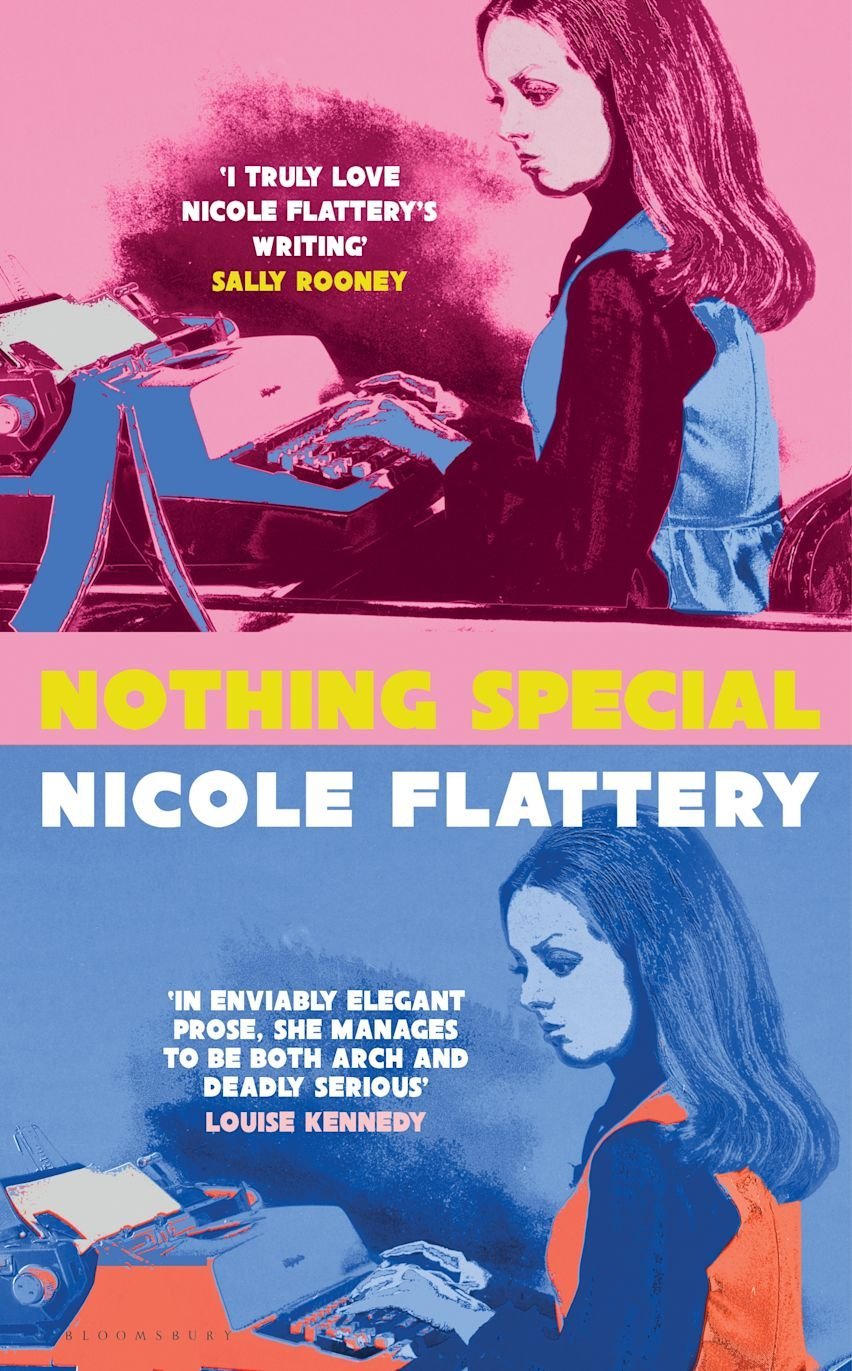
She talks to Rebecca Fox about finding her way as a person and a writer.
Growing up, Nicole Flattery wanted to be an actor.
She grabbed every theatre opportunity she could growing up in the Midlands, inland from Dublin, and confidently headed off to Trinity College to study theatre and film.,
"I wanted to be an actor for a very long time."
However, as she learned more about her chosen trade and got involved in drama groups at university, she began to have second thoughts.
"I sort of fell out of love with it a little bit. I'm sort of like a more internal person. I think I would find the process of auditioning and actually being out there all the time very exhausting."
In a quandary at what to do next, Flattery fell back on her love of English - thanks to her English teacher dad - and reading.
She knew she still wanted to do something creative - she had even briefly toyed with journalism when she was younger - so writing seemed to be the perfect choice.
"When I was growing up, I didn't know any other writers. It just seemed like a very distant, sort of glamorous thing.
"I think there is a big gap between thinking you want to do it and then understanding how to do it."
Even in Ireland where there is a massive literary tradition, the way forward for aspiring writers is not necessarily that clear. even with a variety of arts council grants and mentorship programmes available. So Flattery decided to work for a year while she worked out her next steps.
That was to return to Trinity, to study for her master’s in creative writing. During these years she began writing short stories and submitting them for publication without much luck.
"I think these things can seem very daunting."
One day a friend read one of her short stories and made a few suggestions, which she tried. They worked.
"I suddenly understood how to do something then. I got one story published, then I had another story published. And it just kind of seemed to work from there."
During the next four years she worked on her short stories as much as she could.
Those stories would come together as her first book, Show Them A Good Time, published in 2019 when she was 29. It won a Post Irish Book Award, the Kate O'Brien Award, the White Review Prize and appeared in the Irish Times list of the 100 best Irish books of the 21st century.
"Looking back now, your first book is such an enjoyable process because you don't know what you're writing about or who you are. So everything kind of comes together. "
While the general advice is to avoid short stories as it is hard to get collections published, Flattery is glad she ignored that.
"They're falling out of popularity, which I find kind of mad. They always advise to go straight for a novel, but I really feel like I learned a lot writing short stories.
"It's really how to edit yourself, how to be concise, how to make dialogue work in your favour. Just all of those things. The ability to take away anything like extraneous is incredibly useful."
Although when it came to writing her first novel she may have taken that too far.
"I was taking away everything. I love cutting stuff. I was like, I better stop doing this, because the novel is going to be 20 pages long."

"Even though many people read them as autobiographical, this has never happened to me - it’s impossible for this to happen to someone, sorry to disappoint you."
The process also gave Flattery an insight into the themes and issues she is interested in exploring and writing about.
"When I finished the book and I read over it, I was like this keeps reoccurring. So that was really interesting. I felt very fortunate to have it published."
So when it came to writing her first novel, Flattery wanted to do something different. "Outside my wheelhouse."
She decided on 1960s America, in Andy Warhol’s "Factory". It is from the perspective of two girls typing up a A Novel, the novel Warhol produced in 1968.
"I knew I really wanted to challenge myself. I kind of feel that is purpose of the whole thing. I actually made it so difficult for myself, so I did two perspectives which is always super tricky."
But feeling as though everyone wants things easy these days, her own thoughts were that things should not be easy all the time.
"I kind of do feel that if you want to get rewards, it should be hard. So I think people were surprised that I set the novel where I did. I think people thought I would follow it up with a novel in Ireland. Although it was very challenging, I’m really glad I did it, because I feel like I’ve actually learned a lot writing that book - even if the one thing I learned was never to write another historical novel, I learned that. So it can’t be taken away from me."
The level of historical research required to make a novel believable for the time period is intense.
"But it was like, because of Warhol essentially being who he is, which is one of the most dominant figures of the 20th century, there was a reading list as long as my arm. There was so much to look at. There were so many films to watch. There was so much to explore.
"In some ways, I felt really lucky that I got to do all that. Because I really enjoyed that aspect of it. And looking at his life, which was fascinating."
It got less daunting though as she started to read the biographies of him and those in his orbit as many different stories soon emerged. Many in his orbit claimed to have had the idea of painting soup cans, one of Warhol’s famous works.
"I just realised they all lied all the time. Truly Warhol never stopped lying about everything he did. Even where he came from, even his childhood. If you could read one biography, it would tell you one thing, and another would tell you a completely different thing.
"So I was like, you know what, it's not going to be a problem to fictionalise this. Because it's already fictional. It felt incredibly freeing to find that out."
Flattery found the process of writing the book from there quite fun.
While the setting might be different for this book, she stayed with female characters as she enjoys writing them. It was also an interesting time for women in Ireland when she was writing them, with the repeal of abortion laws and the decline in the power of the Catholic Church.
"I feel like we're in this conversation around female characters in books, and films, and TV shows, and it's often whether or not they're likeable. I feel like that comes up again and again."
Even when she is teaching, her students often comment on how her characters are sometimes not likeable - but writing likeable characters is not what Flattery is interested in doing.
"I think my definition of likeable is pretty broad. I don't think of myself as saintly enough to cast judgement on other people, so everyone is likeable no matter how difficult life is. I just want it to be complex. I think it's more about getting to know and trying to understand a character's complexities or complications rather than making them some moral force or whatever. It just doesn’t interest me at all."
However, she did think the characters in the novel were going to be "pretty likeable", but looking back she admits they might be the "worst roles yet".
"I'd rather read something that is willing to explore that than to look away from it. But it is something that I come up against again and again when people are very aggravated by a character, annoyed or irritated, almost looking at them as if they're a real person."

"I think this is naturally arising out of decades of silence, rather than an industry pegged to push women. I don’t believe that is true. I think more women are writing because they're finding the freedom to do it. I feel it is a very exciting time for Irish fiction in particular."
A great reader herself, Flattery reads "everything" including short stories, although admits she has not read any recently.
"I’ve been reading a lot of novels. And for this book, the latest one, I’ve been reading several plays."
Her theatre studies come in handy at times as she finds inspiration for dialogue in plays.
"Nothing does dialogue better than a play. I do love to go back and see how to play a certain scene, how to say less. But I consistently read novels."
On the nearly 30-hour flight to New Zealand, she read Booker short-listed novel Flesh, by David Szalay.
"It could win. I thought it was brilliant."
While in New Zealand she hopes to read more New Zealand fiction. She is already a big fan of Janet Frame, in particular Faces in the Water, and Eleanor Catton’s debut novel The Rehearsal.
Flattery also has to finish the draft of her next novel. At this stage of her work she finds it helpful to be alone and free of distractions to write solidly for five or six hours at a time, so the residency, based at Caselberg House in Broad Bay, came along at the right time.
"I’m really slow in the beginning and then I’m very quick when I get into something. But it’s impossible to tell when that will be, or when I will be feeling inspired or able to finish something."
When not writing books, Flattery, a keen film buff, writes film reviews and also reviews other authors’ work for the likes of the Irish Times.
"I actually really enjoy it. It feels like it uses a completely different part of my brain. I like thinking about these things, and I like thinking about a book and its context and what it means in this kind of contemporary moment."
She finds writing criticism can provide a relief from the pressures of writing novel-length works.
"It’s an extremely straightforward job. And I think of them as separate things almost. I think also I really enjoy reading good criticism. And even criticism of my own books. It's a real joy to read something where someone's really thought about your book and responded to it."
That is not to say she does not get angry over a bad review.
"But at the same time if someone is paying attention, you might actually be, like, ‘they're right’. So I think getting one of those or being able to read someone's work and give a review like that, it's really great. It's, like, a great way to engage with art. "
As part of her residency, Flattery will be holding workshops and talking to students about creative writing, something she really enjoys.
"I love to know what people are writing about. I'm nosy, I’m curious. I always find it very invigorating to read new work and be excited by it."
Flattery is also looking forward to a holiday at the end of her residency. Her partner is coming out from Ireland and they plan to tour New Zealand for a month.
"I really want to experience New Zealand."
To see
A conversation with Nicole Flattery, Dunningham Suite, Dunedin City Library, August 28, 5.30pm.











